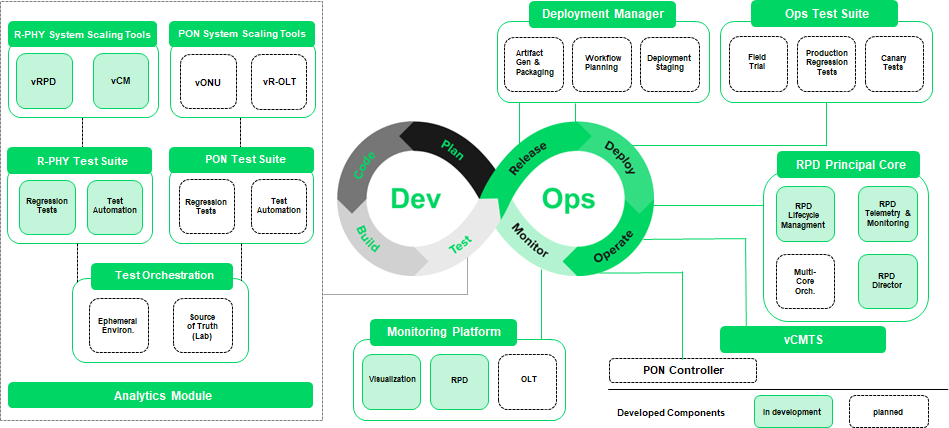Embrace a new horizon of operational efficiency and innovation with our DAA DevOps Platform. New strategic initiative, this platform is conceived from a deep understanding of the challenges telecom operators face during the transition to DAA.
By integrating the DevOps methodology, we bring forth a solution tailored to accelerate, automate, and optimize the crucial stages of testing, releasing, deploying, operating, and monitoring in the telecom sector.
The DevOps Advantage
DevOps, a blend of development (Dev) and operations (Ops), has been a game changer in the software development and IT industry. But devops is not only about software development and release but enhancing the whole ecosystem with a culture focused on building, testing, and releasing software/systems swiftly, reliably, and in a more coordinated manner.
When tailored for the Telco sector, the DevOps process initiates with Agile Development, transitions through Continuous Integration and Continuous Testing, and culminates in an automated delivery process, fostering a seamless workflow from development to deployment.
Challenges in Adopting DevOps
Transitioning to DevOps is a nuanced journey, laden with challenges such as Skill Gaps, High Barriers To Entry, the need for Cross-Functionality, and a commitment to Technical Excellence. Addressing these challenges requires a thoughtful blend of reskilling, gradual integration of processes, fostering cross-functional teams, and a relentless pursuit of technical excellence to ensure seamless interoperability across multi-vendor network environments.
DAA DevOps Platform: A Modular Solution
The DAA DevOps Platform emerges as a modular beacon guiding telecom operators through the realms of DevOps adoption. It’s not merely about navigating the challenges but transforming them into milestones towards accelerated development cycles, enhanced system efficiency, and elevated operational excellence.
The modular design of the platform allows for a stepwise approach to automation, easing the adaptation process while unlocking numerous benefits including faster software delivery, improved time-to-revenue, enhanced cross-functionality, and a streamlined transition to operational efficiency.
Platform Components
Delve into the robust suite of components that constitute the DAA DevOps Platform:
- R-PHY Lab Test Suite: A cornerstone for validating DAA device functionality, identifying network bottlenecks, and empowering informed capacity planning decisions.
- R-PHY System Scaling Tools: Embark on a journey of network simulation and optimization, ensuring cost-effective, high-scale, and accurate control plane emulation.
- Deployment Manager: Streamlining DAA device configuration at scale, ensuring consistency, completeness, and correctness during deployment.
- Ops Test Suite: Orchestrating regression testing in production networks to improve productivity, repeatability, and correctness during maintenance windows.
- Test Orchestration: Accelerating network configuration testing and change approval, ensuring higher quality, more compliant, and more secure network configuration changes in MSO test facilities.
Each component is a gateway to automating and optimizing distinct aspects of the DevOps process, ensuring a harmonized flow from testing to deployment.
The DAA DevOps Workflow
In the face of an ever-evolving telecom sector, managing changes like software upgrades- for virtual function like vCMTS or physical function like RPD – or configuration alterations is crucial for maintaining operational efficiency and ensuring quality service delivery.
Our DAA DevOps Platform significantly streamlines this process, offering a structured and efficient approach to change management. Here’s a step-by-step breakdown of how a change flows through the DAA DevOps Platform:
- Initiation:
- Change Proposal: Changes are initially proposed, whether they are software updates or configuration modifications.
- Test Orchestration: Utilizing the Test Orchestration module, proposed changes trigger automated testing sequences to validate the change’s quality, compliance, and security.
- Validation:
- Regression Testing: The R-PHY Test Suite module facilitates automated regression testing of virtual functiona like vCMTS or physical R-PHY devices and their interaction with network services.
- Simulation: R-PHY System Scaling Tools simulate physical function like RPD or Cable Modems to allow flexible and cost-effective scaling testing in test facilities.
- Preparation:
- Artifact Generation: The Deployment Manager’s Artifact Generation & Packaging module prepares fully verified, region-specific device and service configurations for rapid deployment.
- Deployment Staging: Deployment staging ensures faster changes while maintaining quality and control.
- Deployment:
- Deployment Execution: The Deployment Manager orchestrates the deployment of the change across the network, ensuring proper sequencing and full control.
- Verification:
- Deployment Validation: The Test Ops Engine orchestrates regression testing in production networks during the deployment to validate the changes.
- Real-time Monitoring: Continuous monitoring for immediate feedback on the changes made, identifying any potential issues early.
- Optimization:
- Performance Analytics: Utilizing the analytics modules in both the R-PHY Test Suite and Test Ops Engine, performance data is analyzed for any potential optimizations.
- Continuous Improvement: Deployment manger allows seamless feedback from the deployment for future changes, fostering a culture of continuous improvement.
- Documentation & Compliance:
- Automated Reporting: Generating automated reports documenting the change process, outcomes, and compliance checks.
Conclusion
The DAA DevOps Platform is a enabler of DevOps in cable telecom operations, weaving the DevOps methodology into the fabric of operational processes. This initiative aligns seamlessly with our long-term vision to “Accelerate Transformation in Access Technologies by building an interoperable, scalable, and disaggregated software ecosystem.”
The modular architecture and the comprehensive suite of components within the platform stand as a solid testament to this vision, meticulously crafted to empower telecom operators to seamlessly adopt Distributed Access Architecture (DAA) technology, allowing them to maintain, scale, and operate their networks cost-effectively.
It orchestrates a harmonized flow from testing to deployment, embodying the principles of interoperability, automation, and security which are the linchpins of our strategic goals.
The profound benefits the platform accords encompass faster software delivery, improved time-to-revenue, enhanced cross-functionality, and a streamlined transition to operational efficiency.
We invite you to delve deeper into the features and benefits of the DAA DevOps Platform through our product landing pages or by reaching out for a demo. Discover how this platform can accelerate your journey towards transforming access technologies, ensuring a cost-effective, scalable, and seamless adoption of DAA technology in alignment with our mission, vision, and strategic goals.


